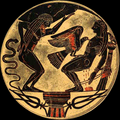Arrogance facts for kids
Arrogance is when someone has too much pride or acts like they are much more important than everyone else. It often means they lose touch with reality and think they are better or more capable than they actually are.
Arrogance is also connected to not being humble and sometimes not truly loving oneself. For example, an arrogant person might always try to make themselves seem superior to others. Sometimes, children who grow up around arrogant people might start acting that way too.
Usually, arrogance is not helpful and can create a negative feeling in a group. However, some people might confuse arrogance with taking pride in their good work. It's important to know the difference.
Arrogance is different from confidence. Someone who is arrogant might actually feel insecure deep down. On the other hand, confidence means you believe in yourself, but you are also willing to learn and improve your weaknesses.
Understanding Hubris
Hubris is an old idea from Ancient Greece. It is similar to arrogance but is often translated as pride. In ancient Greek society, honor was very important. Because of this, hubris had a slightly different meaning than modern arrogance.
For the ancient Greeks, hubris often meant using force or power to shame someone. It was about going too far and disrespecting others, especially those who were weaker.
Images for kids
-
Black-figure pottery (550 BC) showing Prometheus tied to a column as punishment.
-
An illustration by Gustave Doré (1866) for John Milton's Paradise Lost. This shows Lucifer becoming Satan, which is a famous example of hubris.
See also
 In Spanish: Hibris para niños
In Spanish: Hibris para niños



